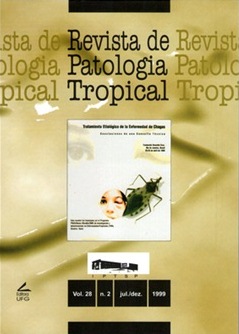CHALLENGES FACED BY THE ÍMMUNE RESPONSE TOWARDS HIV AND Mycobacterium tuberculosis CO-INFECTION
DOI:
https://doi.org/10.5216/rpt.v28i2.17038Abstract
Mycobacterium tuberculosis is responsible for an extremely important life-threateningdisease, which affects approximately one third of the \vorld's population. Tuberculosis (TB)claims more lives than any other single infectious disease. Despite the availability of theBacille Calmette-Guérin (BCG) vaccme and the widespread implementation of DirectlyObserved Short-Course (DOTS), TB hás emerged as a major complication of HIV infectionin both developing and industrialized countries. Using different patfrways, M. tuberculosisinfects macrophages, its preferential habitat, which paradoxically are the chief effector cellsfor killing mycobacteria. The balance between these functions determines the outcome ofinfection. As an intracellular pathogen, protective immunity to M. tuberculosis requires Cell-Mediated Immunity (CMI), which major effector mechanism is the activation of infectedmacrophages by type-1 cytokines, particularly interferon-y, produced primarily by Th-1CD4+ lymphocytes, in response to macrophage products, such as interleukin-12, Cytotoxic TLymphocyte (CTL) response mediated by CD8 + cells also participate in effective CMIagainst mycobacteria. Human Immunodeficiency Virus (HIV) infection is detrimental to M./iíóercií/os/5-infected patients increasing the risk for both primary and reactivation TB, andfor second episodes of TB from exogenous re-infection. The immunologica! explanation hásbecome evident: both pathogens require Th-1 type response, which is compromised in bothinfections. TB hás also had a great impact on HIV: HIV replicates more eíficiently inactivated T cells and virai leveis increase consistently when the immune system is aclivatedby exogenous stimuli, such as M. tuberculosis. The increase in virai replication is associatedwith cytokines released by the activated macrophage, particularly tumor necrosis factor-aand interleukin-1. M. tuberculosis also induces nuclear factor kappa-B, a cellular factor thatbinds to promoter regions of HIV, enhancing its replication. Early identifícation of H1V-TBcoinfection is crucial for prompt anti-mycobacterial and anti-retrovirai therapeutic interventions, before deterioration of the immune system occurs, resulting in improvedsurvival of the patients.Downloads
Downloads
How to Cite
Issue
Section
License
The manuscript submission must be accompanied by a letter signed by all authors stating the full name and email address, confirming that the material has not been published or is under consideration for publication elsewhere, and agreeing to transfer copyright in all media and formats for Journal of Tropical Pathology. The authors will not be paid for published articles. They are solely responsible for the content of those articles, even if the Editor holds the right to adjust them to the norms of the journal.
The reviewers will not be paid for the peer review process.

